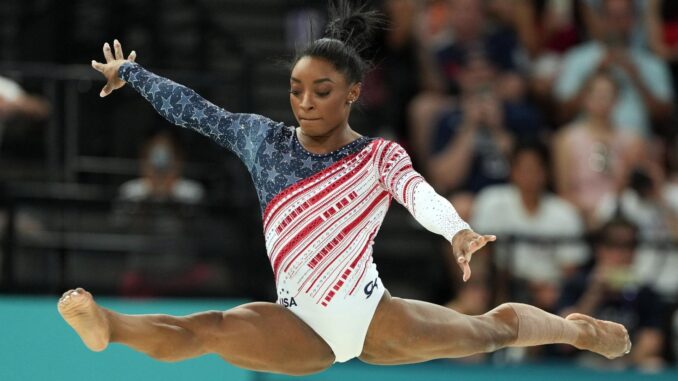
Olympic gold medalist Simone Biles apologized to former college swimmer Riley Gaines after the two engaged in a verbal back-and-forth on X on Friday. In a post Tuesday, Biles apologized for not showing “empathy and respect” in a tweet where she ripped Gaines for the former swimmer’s stance on transgender athletes. I wanted to follow up from my last tweets. I’ve always believed competitive equity & inclusivity are both essential in sport. The current system doesn’t adequately balance these important principles, which often leads to frustration and heated exchanges, and it didn’t help for me…
In her post, Biles said she believed “competitive equity and inclusivity” are essential in sport. She said she did not want to advocate for policies that “compromise fairness in women’s sports.” Biles added that she took issue with Gaines singling out a child in her post. Biles ended her post by saying: “Individual athletes — especially kids — should never be the focus of criticism of a flawed system they have no control over. I believe sports organizations have a responsibility to come up with rules supporting inclusion while maintaining fair competition. We all want a future for sport that is fair, inclusive, and respectful.”
Biles and Gaines engaged in a verbal back-and-forth on X on Friday after Gaines attacked Minnesota’s high school interscholastic governing body for allowing a transgender girl to compete in the girl’s state softball tournament. Champlin Park, with the transgender girl on the mound, won the state 4A championship 6-0. Biles responded to that tweet, calling Gaines a “sore loser” and a “bully.” Gaines — a former swimmer at the University of Kentucky — became a public figure in 2022, when she argued against the inclusion of transgender women participating in women’s sports after she tied for fifth with transgender swimmer Lia Thomas at a meet.
Gaines has continued to lobby for that cause, and appeared in a video on the United States Department of Health and Human Services website in February which argued against allowing transgender women to participate in women’s sports. Gaines responded to Biles’ post Friday, calling it “disappointing.” Over the weekend, Gaines tweeted or shared at least 15 tweets mentioning Biles.
In a surprising turn of events, Olympic gymnastics legend Simone Biles has publicly apologized to former NCAA swimmer and conservative activist Riley Gaines. This apology comes after a heated exchange between the two over the inclusion of transgender athletes in women’s sports. Biles, known for her advocacy for inclusivity, initially criticized Gaines’s stance but later acknowledged the complexity of the issue and the need for respectful dialogue. This incident has sparked widespread discussion about the balance between competitive equity and inclusivity in women’s sports.
The Genesis of the Dispute
Riley Gaines’s Controversial Remarks
The controversy began when Riley Gaines criticized a high school softball team’s championship photo, alleging that it featured a transgender player. She referred to the athlete as “a boy,” which Biles found deeply troubling. Biles, who has been a vocal supporter of transgender rights, responded by calling Gaines “truly sick” and a “straight-up sore loser.”
Simone Biles’s Initial Response
Biles’s reaction was swift and emotional. She expressed her frustration on social media, condemning Gaines’s comments and defending the transgender athlete. However, her response was met with backlash from some quarters, leading her to reconsider her approach.
The Apology: A Step Toward Reconciliation
Biles’s Public Apology
Recognizing the need for a more measured response, Biles issued a public apology, acknowledging that her initial comments were personal and not conducive to constructive dialogue. She emphasized the importance of empathy and understanding in discussions about transgender inclusion in sports.
Gaines’s Reaction
Gaines accepted Biles’s apology but reiterated her position on the issue. She continues to advocate for policies that exclude transgender women from competing in women’s sports, citing concerns about fairness and safety.
The Broader Debate: Competitive Equity vs. Inclusivity
The Case for Competitive Equity
Proponents of excluding transgender women from women’s sports argue that biological differences give transgender women an unfair advantage. They cite instances like Gaines’s tie with transgender swimmer Lia Thomas at the 2022 NCAA Championships as evidence of the need for policy changes.
The Case for Inclusivity
On the other hand, advocates for inclusivity argue that sports should be accessible to all, regardless of gender identity. They believe that excluding transgender women undermines the principles of equality and fairness that sports are meant to promote.
The Role of Title IX
What Is Title IX?
Title IX is a federal law that prohibits discrimination on the basis of sex in education programs and activities, including sports. It has been instrumental in promoting gender equality in athletics.
Implications for the Current Debate
The current debate raises questions about how Title IX applies to transgender athletes. Some argue that allowing transgender women to compete in women’s sports aligns with the law’s intent to prevent sex-based discrimination. Others contend that it conflicts with the law’s goal of ensuring fair competition for female athletes.
Public Figures Weigh In
Support for Biles
Many public figures have expressed support for Biles’s stance on inclusivity. They commend her for using her platform to advocate for marginalized communities and for promoting respectful dialogue on complex issues.
Support for Gaines
Conversely, some public figures have sided with Gaines, praising her for standing up for what they perceive as fairness in women’s sports. They argue that her experiences as a female athlete give her unique insight into the challenges posed by the inclusion of transgender women in women’s sports.

Looking Ahead: Finding Common Ground
The Need for Dialogue
The incident between Biles and Gaines underscores the importance of open and respectful dialogue on contentious issues. While they may not agree on every point, their willingness to engage in conversation sets a positive example for others.
Potential for Policy Change
The debate also highlights the need for clear and fair policies regarding the inclusion of transgender athletes in sports. As the conversation continues, it is hoped that solutions can be found that balance inclusivity with competitive equity.
Conclusion: A Turning Point in the Conversation
The public apology from Simone Biles to Riley Gaines marks a significant moment in the ongoing debate over transgender inclusion in women’s sports. It demonstrates the power of empathy and the importance of respectful discourse in navigating complex issues. As the conversation continues, it is essential to consider all perspectives and work toward solutions that uphold the values of fairness and inclusivity.